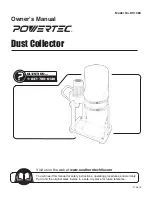
3
oneida-air.com
System Start-Up Information (Continued)
d. NFPA664 Code book, “Standard for the Prevention of Fires and Explosions in Wood Processing and Woodworking
Facilities”, applies to woodworking operations that occupy areas of more than 5,000 sq. ft. or to areas where dust
producing equipment requires an aggregate dust collection flow rate of more than 1,500 cfm (cubic feet per minute).
This exempts some small operators from the NFPA code 664, but other codes may apply in your jurisdiction. Consult
your local Fire Marshal for help. Additional information can be found in NFPA Code Book 664.
4. The customer assumes the responsibility for contacting their insurance underwriter regarding specific application
requirements of explosion venting or if additional fire protection and safety equipment may be required.
5. DO NOT use this product to collect other types of flammable dust or flammable vapors! - Fire or explosion may occur!
6. NEVER collect sparks from a bench grinder into a wood dust collector.
7. NEVER introduce sparks or sources of ignition into the dust collector.
8. Personnel should be kept at least 20 ft. away from unit.
9. Check dust bin frequently and before leaving the shop for smoldering material.
10. Keep portable fire extinguishers handy.
a. The ABC type (dry chemical) is generally a good choice for small wood shops.
b. Additional information on portable extinguishers can be found in NFPA 10 (Standard for Portable Fire Extinguishers).
11. Be especially careful with sanding units. They can produce concentrations of dust in the combustible range. Make certain
enough air volume is at the suction point to capture all the particulate generated.
12. This high air volume will dilute the mixture below the lower limit of flammability. Be careful not to generate sparks into the
sanding dust.
13. Empty dust bin and clean filter often, especially when sanding.
14. DO NOT overload woodworking equipment, especially sanders. Excessive frictional heat can spontaneously ignite dust.
15. Sparks can be generated in several ways:
a. High speed sanders and abrasive planers may strike foreign material.
b. Saws and edgers may strike foreign material and create a red-hot metal fragment.
c. Knots in hardwood can create frictional sparks.
d. Trapped metal when drawn into the collector can spark against ductwork.
e. Check wood stock for old nails and screws which can create red hot metal fragments.
16. Avoid using excessively large wood waste bins.
17. ALWAYS check storage bins for smoldering material before leaving for the day.
18. Electrically ground all equipment and ducting. Static sparks can ignite wood dust. (Avoid using PVC drain pipe.)
19. DO NOT allow accumulation of layers of fine dust on horizontal surfaces (especially overhead lights, electrical boxes and
fuse panels which can ignite dust.)
20. UNPLUG UNIT BEFORE SERVICING OR CLEANING
Customer Service Dept.
1-866-387-8822 • [email protected]
Summary of Contents for 7247180
Page 2: ......
Page 27: ...25 oneida air com Notes...


































